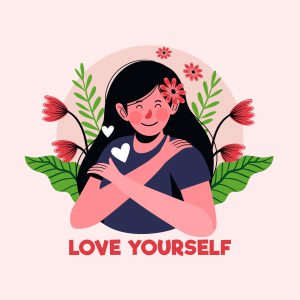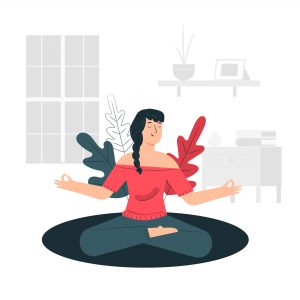
A very popular K-Drama series ‘It’s Okay to Not Be Okay’ shows how different people who were dealing with their own personal issues when came together slowly began to heal each other’s emotional wounds and with time they unravel many secrets, seek solace from each other and move forward in their lives.
This series beautifully shows how imperfect our lives can be and yet we can find happiness and peace in that imperfection.
It’s the very human nature from the beginning of comparing our lives with others or wanting things that others have.
Why don’t I have a car like he/she has?
Why don’t I have a body like her?
Why don’t I have shoes like him?
Why don’t I have a house that big?
Why don’t I have that latest iPhone model?

The list goes on forever…
And it’s just not the material things but can be any aspect of life. Be it not getting the desired exam result, subject of choice, college of choice or sometimes, even the friend you desire. Especially during the Covid times when things are so unpredictable that we can’t control it. And with that loss of control, comes the fear of the unknown which is something you can’t even prepare for. Feelings of sadness, fears, anxiety and stress are looming over people’s lives and have affected all age groups. That means it’s just not you but everyone around you is experiencing the same feelings as you are and the same has affected their mental health. But we all have good days and bad days; it’s part of life. And it’s okay to feel negative emotions; those negative emotions balance out our positive ones. Having emotions and feelings only makes you human. It’s okay to not to be okay. You may say that you don’t see an end to your pain, but the only way out of your pain is through it.

If you find yourself going through a hard time, seek out the support of people who love you. Take as much time as you need to feel the emotion and recover. No matter what the external world tells you, you don’t have to be perfect, and it’s okay if you don’t feel okay.
The Leaning Tower of Pisa in Italy wasn’t supposed to be leaning.
And if it wasn’t leaning, it would merely be The Tower Of Pisa, But perfect isn’t even a real thing!
There’s no such thing as perfect. Perfect in your mind may not be perfect in another’s.
In traditional Japanese aesthetics, Wabi-sabi is the view or thought of finding beauty in every aspect of imperfection in nature. It is about the aesthetic of things in existence, that are “imperfect, impermanent, and incomplete”. If a tea pot or bowl is broken they don’t just throw it away, instead they bring the pieces of broken pottery back together and glue them with liquid gold, which makes them imperfect, permanently and inevitably flawed, but somehow, more beautiful.
It teaches us that there is great beauty in broken things and every scar tells a story. They demonstrate fortitude, wisdom, and resilience which we earn with time. And we don’t need to hide these imperfections or golden scars when we are meant to celebrate them.
We must consider our failures, shortcomings, hurdles as lessons how not to do things, and learn from our mistakes the important lessons of forgiveness, and letting go.
As Beth Kempton writes in her book, WabiSabi, a Japanese Wisdom for a Perfect Imperfect Life:
“Put simply, wabisabi gives you permission to be yourself. It encourages you to do your best but not make yourself ill in pursuit of an unattainable goal of perfection. It gently motions you to relax, slow down and enjoy your life. And it shows you that beauty can be found in the most unlikely of places, making every day a doorway to delight.”
These are a few ways how you can embrace Imperfection.
- Acceptance: The sooner you accept all the good & bad things life throws at you, the lighter you will feel. We find our freedom through acceptance & out of acceptance, we find our path to growth.
- Strive for Excellence, not Perfection: Use your talents, abilities, and skills in the best way possible and simply do your best in everything you do.
- Embrace Change: Don’t see change as an adversity, but rather an opportunity to improve yourself or try new things. Stay positive about your situation, capabilities, and ability to adapt to change.
- Never stop Believing in Yourself: When you acknowledge your worth and refuse to doubt yourself, you make sure that no one questions your abilities. Your belief and your confidence proves to the world that you have what it takes to be successful.
Love,
Seedling.
